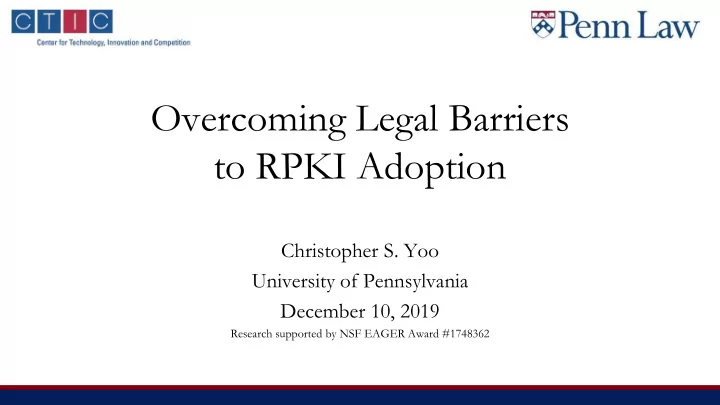

Overcoming Legal Barriers to RPKI Adoption Christopher S. Yoo University of Pennsylvania December 10, 2019 Research supported by NSF EAGER Award #1748362
Global RPKI Deployment ASes Validating Routes 5%, 5 3%, 3 9%, 8 12%, 11 71%, 65 RIPE APNIC ARIN LACNIC AFRINIC Source: APNIC ROV Deployment Monitor 80% of those engaging in ROV omit the ARIN TAL (Cartwright-Cox, 2018) 2
Initial Observations Real-world developments Filtering by AT&T/interest by Google and Cloudflare New validator software by Cloudflare and NLnet Labs Use of RPKI by NTT to clean up Internet Routing Registry (IRR) Complications surrounding JPNIC’s deployment and outage by ARIN ARIN revisions on October 21, 2019 Legal concerns Need for address holders to sign Registration Services Agreement (RSA) Decision whether to maintain own ROAs or delegate to ARIN Need for ISPs to accept Relying Party Agreement (RPA) on ARIN’s website 3
Existence of the Relying Party Agreement (RPA) Current practice: requirement of click-through acceptance of RPA to access ARIN’s TAL (unique to ARIN; others use online terms) Our recommendation Acknowledge existence of valid arguments for abolishing and keeping RPA Explore incorporation of acceptance into distribution of validator software Explore enterprise-level agreements ARIN’s decision Retain RPA because of litigiousness of U.S./overhanging negligence liability Enable integration of RPA acceptance into validator software Note: no cases on record re RPKI, TLS, SSL, DNSSec, or IRR 4
RPA Terms – Indemnification Current practice: requirement to indemnify, defend, hold harmless RIPE NCC: online terms include disclaimers of warranties APNIC: online terms include indemnification (no duty to defend) LACNIC and AFRINIC: no clauses Our recommendation Replace indemnification with as-is disclaimer/no consequential damages Consider creating separate entity for RPKI to limit liability ARIN’s decision No indemnification for gross negligence or willful misconduct Inclusion of as-is disclaimer, no consequential damages, limitation of liability 5
RPA Terms – Prohibited Conduct Clause Current practice: prohibition of sharing RPKI-derived information in a “machine-readable format” Blocks use for error reporting and research Blocks real-time uses/integration into IRRs Note: other RIRs have no analogous provision Our recommendation: revise to permit research and real-time uses ARIN’s decision Allowance of use of RPKI-derived data for informational purposes Creation of Redistributor RPA: can distribute info to third parties who signed RPA and passed through terms limiting liability and indemnification 6
RSA Terms Current practice Willingness to waive indemnification and choice of law when required by law Requirement that legacy holder acknowledge no property rights in addresses Our recommendation Publicize willingness to waive clauses when required by law Follow RIPE NCC’s creation of a non-member services agreement ARIN’s decision No changes to terms (still includes blanket indemnification) No publicity about willingness to waive Legacy holders sign RSAs for IPv6; RPKI not deploying for IPv6 7
Other Possible Developments Inclusion of RPKI in public and private procurement requirements Education about the proper configuration by ISPs (esp. failover) Broader disclosure of ARIN’s practices Information on uptime, update frequency, response expectations, etc. Expanded Certification Practice Statements Clear guidance about best practices/incentive to deploy them More robust software tools (new Cloudflare & NLnet validators) 8
Recommend
More recommend